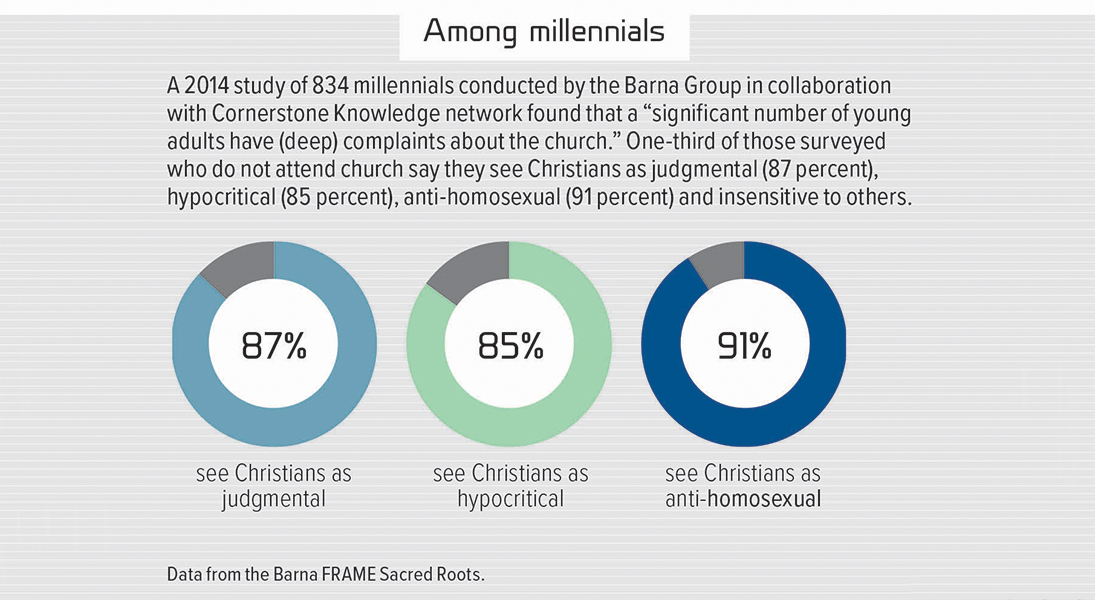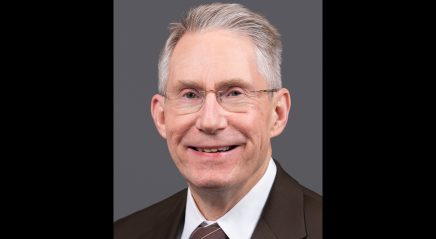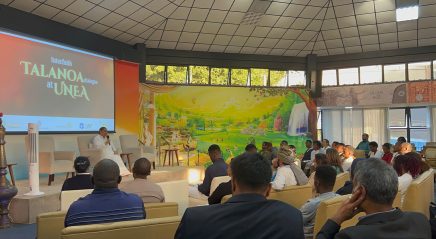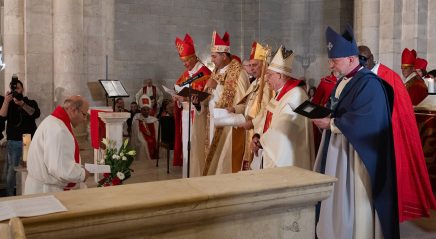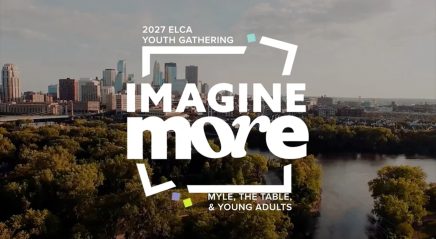Three years ago when Seth Nelson began his call at Faith Lutheran Church in Ronan, Mont., his parishioners repeatedly asked him: “Why aren’t people your age coming to church?”
Nelson, 32, didn’t know. But it got him thinking, “Why was I drawn deeper and deeper into the church while others [my age] left it behind?”
This enigma led Nelson to research, write and self-publish a book on the topic—The Church Unknown (2016).
“In reality, there are many, varied and complex reasons as to why a horde of young people are bailing on the church,” he said.
A 2016 Public Religion Research Institute study affirms this complexity, but notes that for those who grew up religious, “a lack of belief in the teaching of religion was the most commonly cited reason for disaffiliation.”
Nelson noticed that the church isn’t alone in “feeling a crunch.” Both it and other membership-based institutions that thrived in an earlier era aren’t being embraced by millennials in adulthood, the Pew Research Center reports.
Current records from the ELCA churchwide organization reflect this trend: 9 percent of known ELCA members are millennials while 84 percent belong to previous generations.
Where are millennials gathering?
Before digital communication, the church and other institutions like it served as a central meeting place for adults, Nelson said. But today worship attendance continues to drop from its peak in the 1950s and 1960s, especially among millennials who now see church as one choice among many for how they spend their leisure time, Nelson said.
“In reality, there are many, varied and complex reasons as to why a horde of young people are bailing on the church.” — Seth Nelson
In the 2015 report “How we gather,” Harvard Divinity students Angie Thurston and Casper ter Kuile argue that millennials are “decidedly looking for spirituality and community in combination,” but many are meeting this need at the gym, through special-interest groups or elsewhere.
“The personal sharing and support you might have once received in a church community, people are finding in social media groups, ultimate Frisbee, you name it,” Nelson added.
Brian Beckstrom, campus pastor of Wartburg College, Waverly, Iowa, has observed this in his nine years working with millennial students. “Younger adults tend to organize as people always do—around tribes,” he said. He sees many millennials forming communities based on shared interests, whether that be fitness, politics, video games or music.
Brianna Lombardo, 30, who grew up Roman Catholic but no longer attends mass regularly, found her tribe through a community of yogis, both at her studio and via social media. She started practicing yoga after a “brutal breakup” and being diagnosed with clinical depression. Later, Lombardo went on to instruct classes too.
“Through [yoga], I’ve connected with amazing people, not just in Chicago but all across the U.S. and world,” she said. “It has given me a sense of hope that I can overcome depression even on my worst days.”
What are they seeking?
Rather than dwell on low numbers, Nelson asserts in his book that, in order to grow, the church needs to “stop asking why people are leaving … and focus instead on why people would want to come and be part of our communities.”
That answer might be as simple as an invitation. Beckstrom did some research among Wartburg students on their top spiritual influences. “The major thing was friends,” he said.
Timothy Baird, 21, didn’t grow up attending church but got involved in Wartburg’s “Sanctuary” services because his fiancee, Rebecca Bennett, invited him. “At first it was simply for Rebecca’s sake, but after a while I started attending because I wanted to,” he said.
A music major and musician, Baird even began singing in Sanctuary’s worship band. “I would say ultimately what drew me toward faith was Rebecca and music,” he said.
Betsy Hedberg, 29, visited Catholic mass each Easter and Christmas with her family, but only began going to a different church regularly after her friends invited her to visit their youth group. The experience drew her deeper into a community of faith, she said. Today the Minnesotan attends a Lutheran church with her husband and son. “Church is an important place to find community in Christ,” she said.
Craving authentic connections
After Peter Severson, 30, relocated to Denver to work as director of Lutheran Advocacy Ministry–Colorado, he began looking for a congregation because it was important to him to care for his spiritual life. The lifelong Lutheran and former volunteer with ELCA Young Adults in Global Mission found his faith community, House For All Sinners and Saints, Denver, in the same way Baird and Hedberg did—through friends.
House is a growing, young ELCA congregation that describes itself as “queer-inclusive” and “social justice-oriented.” Many of its members didn’t grow up Lutheran, yet “it’s a liturgically and theologically orthodox community as far as Lutheranism goes,” he said.
For Severson, the authenticity found at House is key. “There’s a lot to be said about the authenticity and vulnerability people feel free to experience in [this] community and how faith animates people to be free in that environment,” he said. That’s what has kept him connected, and the relationships he’s made because of it, he said.
People and places that reflect the radical, inclusive love of Jesus are what today’s young adults are searching for in a congregation, said Don Romsa, ELCA program director for campus ministry.
“Some of our students who graduate and leave our campus ministry programs have difficulty finding a congregational home in which they feel warmly accepted and affirmed for what they have to offer,” Romsa said.
Instead, they look elsewhere for spiritual nurture. In fact, 2 out of 5 millennials say they find God outside of church walls, according to the Barna Group.
This is the case for Kimberly Compton, 30, who left the church twice (one Baptist; the other a nondenominational new start) over incongruencies in what was professed and what was actually practiced. She wants to find a church home where “what we say and do lines up, [but] it’s hard to find a church in Richmond, Va., that’s talking about social justice and Black Lives Matter. … I find my church in a kayak on the Deans River on Sunday morning.”
In his work, Nelson has observed that some ELCA congregations struggle to create spaces for these real connections to be made because “there’s a resistance to vulnerability.”
Leading across the church
From an early age, Ángel Marrero was involved in the life and ministry of Christo Victorioso Lutheran Church, Vega Baja, Puerto Rico. At 7, he was an acolyte; at 16, he served on synod council; and growing up, he preached at church events.
Now 28, the mission developer credits his home congregation and synod for entrusting him with leadership opportunities that gave him “a sense of belonging in the church.” That is why he has stayed in the church, he said, even though many of his peers have left. While serving with the Caribbean Synod, Marrero said he never felt like “the token young person in the room,” but was treated as a vital member of the council.
Today, Marrero emulates this leadership model as pastor of Santuario Luterano, Waltham, Mass. He regularly invites millennials to fill leadership roles in the congregation, which is 100 percent Latino and includes young families.
When asked what he believes the ELCA needs to do to welcome millennials, Marrero said, “I’d like to see young adults at the center [of the church] and being entrusted with very important things in the life of the church. … Why not let young adults be bishops?”
In his life and at Santuario, Marrero has seen the power of authentic engagement in retaining young adults.
Savanna Sullivan, ELCA director for young adult ministry, agrees: Congregations with the most active millennials “allow young adults to reach, to preach, to go to events, to plan service opportunities. The [congregations] where young adults are in the pews are [those] that offered them opportunities to be leaders.”
“I’d like to see young adults at the center [of the church] and being entrusted with very important things in the life of the church. … Why not let young adults be bishops?” — Ángel Marrero
For its part, the ELCA is taking steps toward change. Of the 62 congregations that started in 2016, 21 percent are being led by millennials. And through the ELCA Fund for Leaders, scholarships are awarded to aspiring rostered ministers, many of whom are young adults when they enter seminary (Nelson was one of them).
As part of Always Being Made New: The Campaign for the ELCA, grants are also being awarded to new young adult ministries. One such ministry is the Bend (Ore.) Youth Collective, where Kyra Butler, 28, is a leader.
She connected with Ron Werner, a mission developer working with the collective, a multidenominational project to help young people develop leadership skills as local activists. When Werner invited Butler to be a leader, she said “yes” immediately.
“The thing about the ELCA is that everything I’ve been hearing people say, ‘This is where we want to go; this is the kind of church we want to be—we’re trying to be more accepting, more welcoming, we want to include young people,’ ” Butler said. “I’m not hearing any other denomination say that.”
Hungry for Jesus
Many young adults, Romsa said, “really aren’t hungry for more church structure, or smooth programming, or better praise bands, or fun social activities—they are hungry for the radical Jesus they discover in the Bible. In this Jesus, they see a God who is real—present on the margins, willing to shake things up, on the side of the lowly, choosing to die without status, and always radically loving us and the world.”
The more congregations that proclaim this Jesus, the more the church will find opportunities to engage millennials, Romsa said.
Although studies and articles predict the continued decline of the church, Nelson, for one, isn’t worried. Out of death, he said, comes resurrection.
“Ultimately, I’m an optimist,” he said. “The church is not a result of our ability to get it right. Our hope is rooted in the Holy Spirit. If we are a church willing to be broken and vulnerable, we will really find an audience.”
About American millennials
Largest living generation in the United States (U.S. Census Bureau).
Born between 1982-2000; age 17-35 (Census Bureau).
First generation of “digital natives” (Pew Research Center).
Most highly educated and culturally diverse generation in the U.S. (Pew).
Individualistic/narcissistic (Generation Me, 2006).
More socially conscious/liberal than elders (Pew).
Detached from institutions and networked with friends (Pew).
Millennials speak out
More than 30 millennials from varied religious upbringings lent their voices to the research for this article.
Here are a few reasons why they don’t attend church:
“I don’t agree with the church’s stance on certain topics and
I don’t see that those stances embody the teachings of Christ.”
– Mallory Holy
“It’s just not an experience that feels impactful to me personally,
I want to be out doing good in the world.”
– Grace Gold
“The advent of social media and mass communication makes it light-years easier to organize social events and gatherings. Now we can just text, email and Facebook events to each other.”
– Chris Helland
“I like God. I don’t think many places have church right.”
– Shaun Hautly
“Baby at home, working full time … my weekend days feel precious and, to be honest, I just don’t go because I don’t want to.”
– Emily Lehman
“It was my transition back into North American culture (after
Young Adults in Global Mission) that made me feel less connected to the church and more connected to people. … I [am] feeding that need in other ways by volunteering.”
– Amanda Tompkins
Here’s why they still belong:
“I really wanted to be involved in church but didn’t know how until I found another church. Leadership … has really opened up my faith.”
– Leemu Garyu
“I need that special time to worship God and help me grow deeper in understanding.”
– Kim Zoellick
“Church is where we receive the means of grace and join in fellowship with the body of Christ.”
– Benjamin Anderson
“I’m Catholic so like, guilt. I try to go regularly.”
– Lauren Finney
“My granny took me. … In high school and college, church really became my tribe, my passion. I need Sunday or everything feels off.”
– Blake Scalet
“I want my children … to know their creator and savior and one day live with him in heaven, because at the end of this life that’s what’s really important.”
– Kristen Holz



